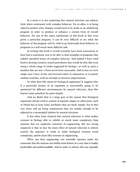In a sense it is not surprising that natural selection can achieve little when confronted with complex behavior. For in effect it is being asked to predict what changes would need to be made in an underlying program in order to produce or enhance a certain form of overall behavior. Yet one of the main conclusions of this book is that even given a particular program, it can be very difficult to see what the behavior of the program will be. And to go backwards from behavior to programs is a still much more difficult task.
In writing this book it would certainly have been convenient to have had a systematic way to be able to find examples of programs that exhibit specified forms of complex behavior. And indeed I have tried hard to develop iterative search procedures that would do this. But even using a whole range of tricks suggested by biology—as well as quite a number that are not—I have never been successful. And in fact in every single case I have in the end reverted either to exhaustive or to purely random searches, with no attempt at iterative improvement.
So what does this mean for biological organisms? It suggests that if a particular feature of an organism is successfully going to be optimized for different environments by natural selection, then this feature must somehow be quite simple.
And no doubt that is a large part of the reason that biological organisms always tend to consist of separate organs or other parts, each of which has at least some attributes that are fairly simple. For in this way there end up being components that are simple enough to be adjusted in a meaningful fashion by natural selection.
It has often been claimed that natural selection is what makes systems in biology able to exhibit so much more complexity than systems that we explicitly construct in engineering. But my strong suspicion is that in fact the main effect of natural selection is almost exactly the opposite: it tends to make biological systems avoid complexity, and be more like systems in engineering.
When one does engineering, one normally operates under the constraint that the systems one builds must behave in a way that is readily predictable and understandable. And in order to achieve this one typically




